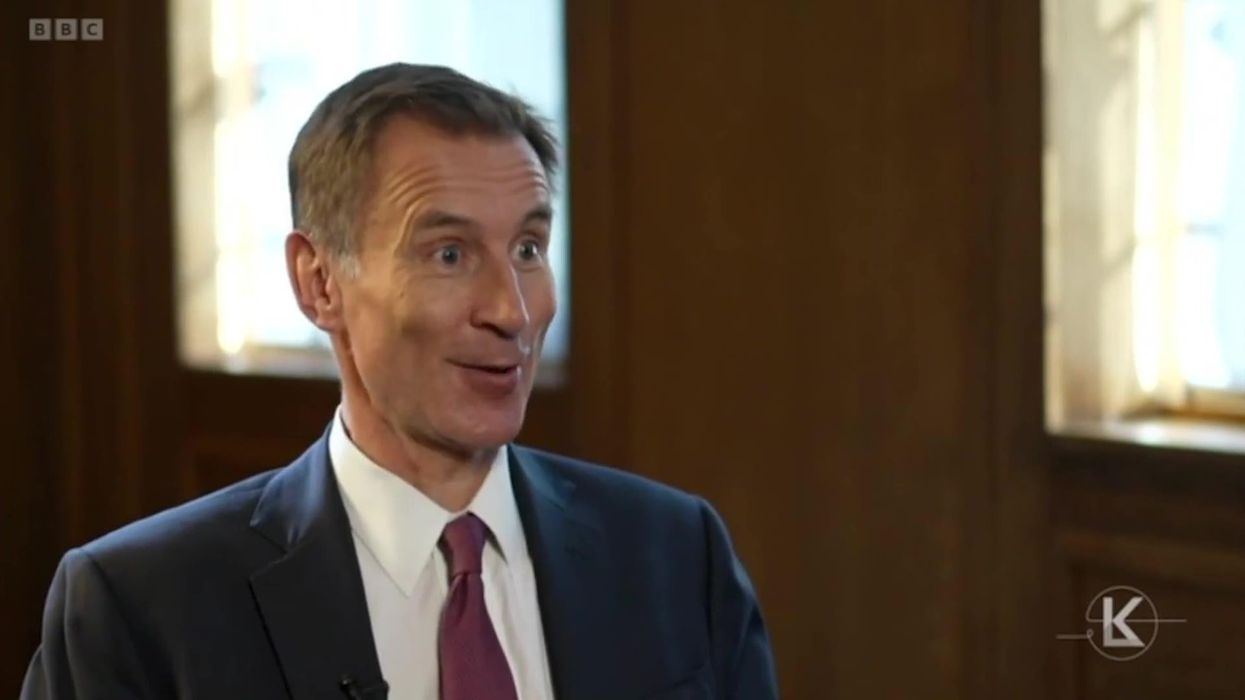Politics
Kate Plummer
Nov 17, 2022
Jeremy Hunt 'doesn't think' austerity levels will return to 2010 period
Indy
We all love a bit of nostalgia, don't we? And we might look back on the period between 2010 and 2019 fondly.
There was some decent music, good TV and films, and we even had the Olympic Games.
But one thing we don't miss from the decade gone by is austerity - a period of spending cuts imposed by then prime minister David Cameron and his chancellor George Osborne that had horrific consequences for the people of Britain.
Sadly for us though, a new decade later the economy is in tatters again and today chancellor Jeremy Hunt will announce his Autumn Statement in which he is expected to brace us for spending squeezes across government departments except health (though not to the same extent as last time).
It has been reported he will announce a ratio of 55:45 in spending cuts and tax rises in a hope to curb inflation and boost the economy.
Sign up to our free Indy100 weekly newsletter
Yes - they say history repeats itself, we just didn't expect it to repeat itself so soon. Especially when we can merely glance back into the past and remember just how bad Cameron's austerity programme was for Britain.
Here's 11 reasons why austerity 1.0 was so terrible and shouldn't be repeated:
1. It "entrenched" poverty
United Nations expert Philip Alston said in 2018 that efforts to reduce spending were “entrenching high levels of poverty and inflicting unnecessary misery in one of the richest countries in the world.”
“The introduction of Universal Credit and significant reductions in the amount of and eligibility for important forms of support have undermined the capacity of benefits to loosen the grip of poverty,” he said in a statement.
2. It left people reliant on food banks

In particular, the use of food banks almost doubled between 2013 and 2017, according to Trussell Trust figures.
3. It gutted the NHS
And while people were struggling to eat, they were struggling to get treated in hospitals too. 2010 training cuts left the NHS short of 100,000 nurses and doctors, the Guardianreported.
4. It stalled lifespans
Which could be why it had an impact on mortality. Sir Michael Marmot conducted a review in 2020 and found that life expectancy is stalling for the first time in a century. He blamed austerity for this state of affairs.
“This damage to the nation’s health need not have happened. It is shocking,” said Marmot, who is the director of the UCL Institute of Health Equity.
“The UK has been seen as a world leader in identifying and addressing health inequalities but something dramatic is happening. This report is concerned with England, but in Scotland, Wales and Northern Ireland the damage to health and wellbeing is similarly unprecedented.
“Austerity has taken a significant toll on equity and health, and it is likely to continue to do so. If you ask me if that is the reason for the worsening health picture, I’d say it is highly likely that is responsible for the life expectancy flat-lining, people’s health deteriorating and the widening of health inequalities.
“Poverty has a grip on our nation’s health – it limits the options families have available to live a healthy life. Government health policies that focus on individual behaviours are not effective. Something has gone badly wrong.”
5. It cemented regional inequality
The policies also had an impact on household wealth that differed across regions in the UK. The Office for National Statistics (ONS) tracked the change average household wealth between 2006 and 2020, after inflation.
It suggested that in London, average household wealth increased by 63 per cent, to £340,300. By contrast, in north-east England it fell by 17 per cent, to £168,500.
6. It created 'baby banks'
As well as increasing the use of food banks, austerity has been linked to the growth of 'baby banks' which provide emergency supplies like nappies, clothes and shoes for little or no money. The BBC say there weren't many in 2010. Today there are more than 200 across the UK, though they note the pandemic also impacted their rise.
7. It ruined Britain's GDP
And austerity wasn't even all that useful for the economy. Consider this - the OBR found that the last round of austerity knocked off 1 per cent of the country's GDP. Was it worth it?
8. It was linked to 120,000 deaths
We'd say no when you think about a study published in 2017 that found that austerity could have been to blame for 120,000 deaths.
The BMJ paper found that there were 45,000 more deaths in the first four years of Tory-led efficiencies than would have been expected if funding had stayed at pre-election levels.
9. It was linked to poor mental health
Another journal linked austerity to poor mental health outcomes. It said: "Welfare policies and austerity measures implemented since 2010 may have contributed to recent increases in mental health problems and widening inequalities. This has led to rising numbers of people with low levels of education out of work with mental health problems. These trends are likely to increase social exclusion as well as demand for and reliance on social welfare systems."
10. It closed libraries
And in 2019 it was reported that 800 libraries closed since 2010 and the austerity programme. Who needs books anyway?
11. It made prisons struggle
Under austerity measures, prison budgets were cut by 22 per cent, from £3.47 billion in 2010/2011 to £2.71 billion in 2016/17. A paper published in the Journal of Public Health in 2020 said the number of front-line prison officers in English and Welsh prisons dropped by some 30 per cent between 2014 and 2017 while the number of prisoners remained high.
This was, spoiler alert, not good according to the journal's authors who said: "This created a severe staffing deficiency, with 4.6 prisoners for every staff member, fewer than half of the number found in other European countries.
"Thus, reduced funding can be linked to the current overcrowding and instability of the carceral regime".
What is the point in austerity 2.0?
Aside from how bad the measures in the past were, an Institute for Government paper published last month has said austerity might not even work this time.
It found: "Public services are in a much more fragile position now than in 2010. This is a result of both the first round of austerity and more recently the pandemic. Cuts are therefore likely to be both more damaging and harder to deliver."
It also said previous staffing cuts and pay freezes "are not politically or practically viable now" and that some service cuts could be counterproductive by creating demand on other services.
With all that in mind, it is no wonder a repeat round of measures like these is seen as one of the least popular policies going.
It is a simple and fundamental principle that the government derives its democratic legitimacy from the people. The future of the country must not be decided by plotting and U-turns at Westminster; it must be decided by the people in a general election. And for this reason The Independent is calling for an election to be held. Have your say and sign our election petition by clicking here.
Have your say in our news democracy. Click the upvote icon at the top of the page to help raise this article through the indy100 rankings.
Top 100
The Conversation (0)














